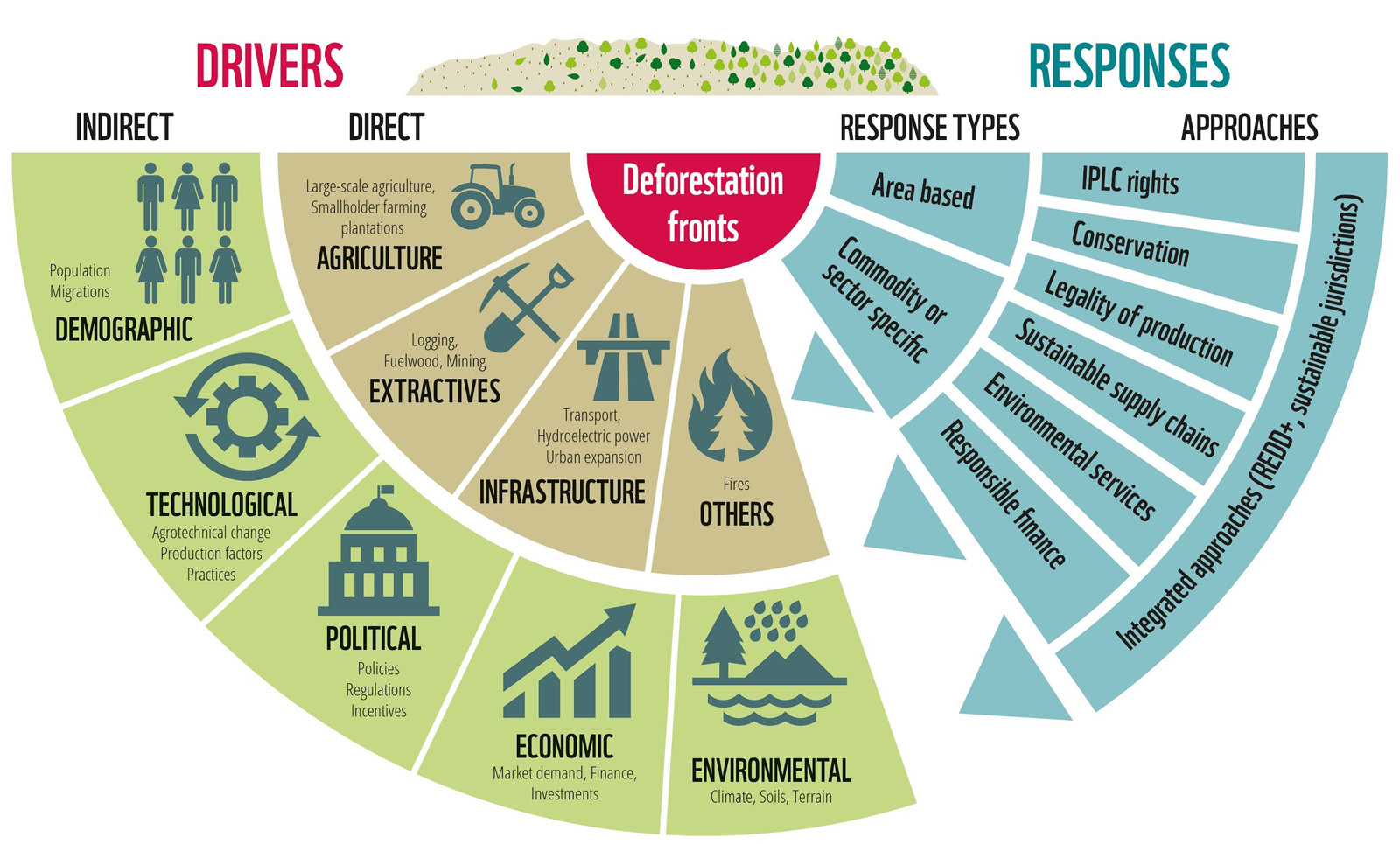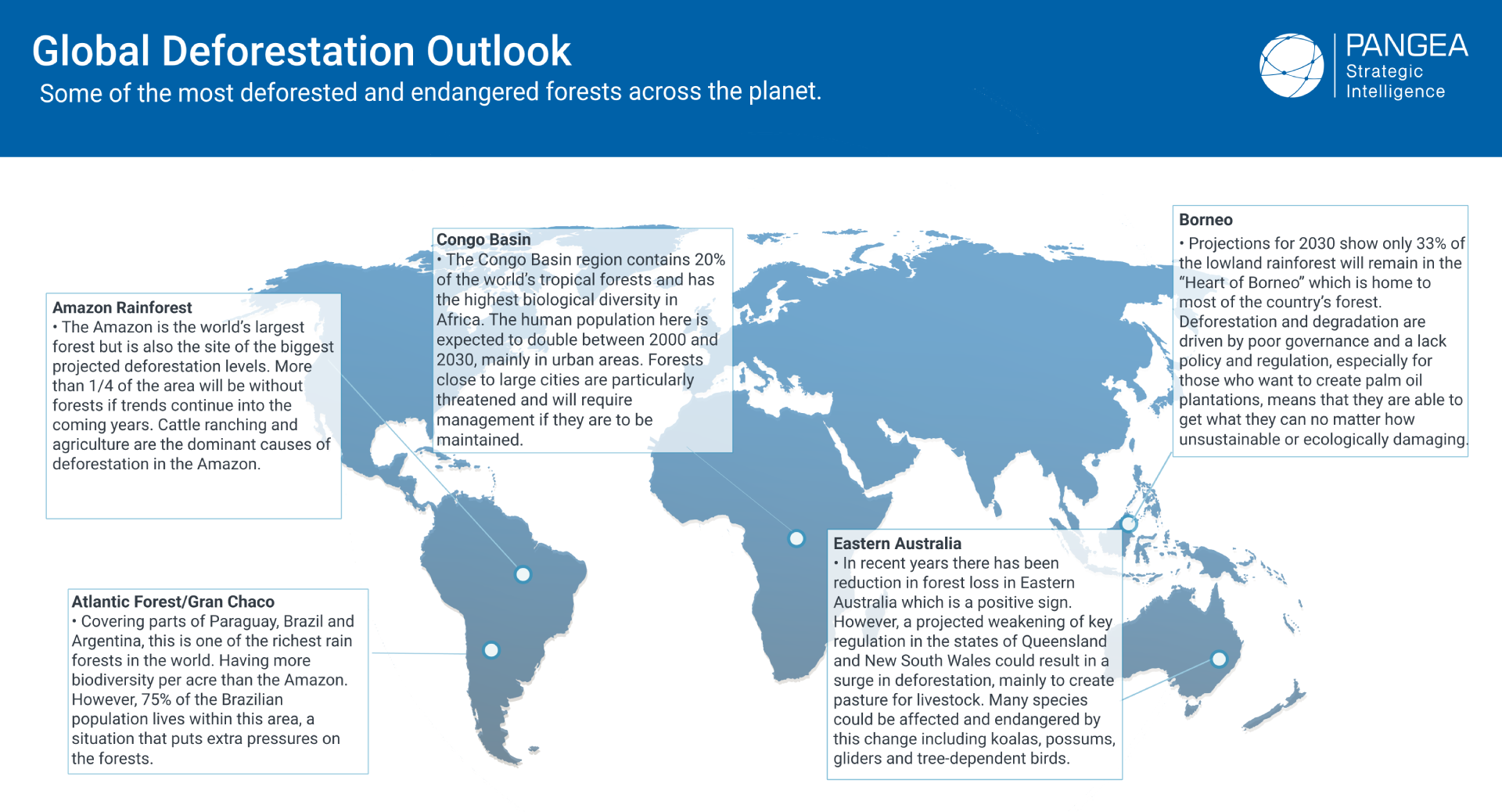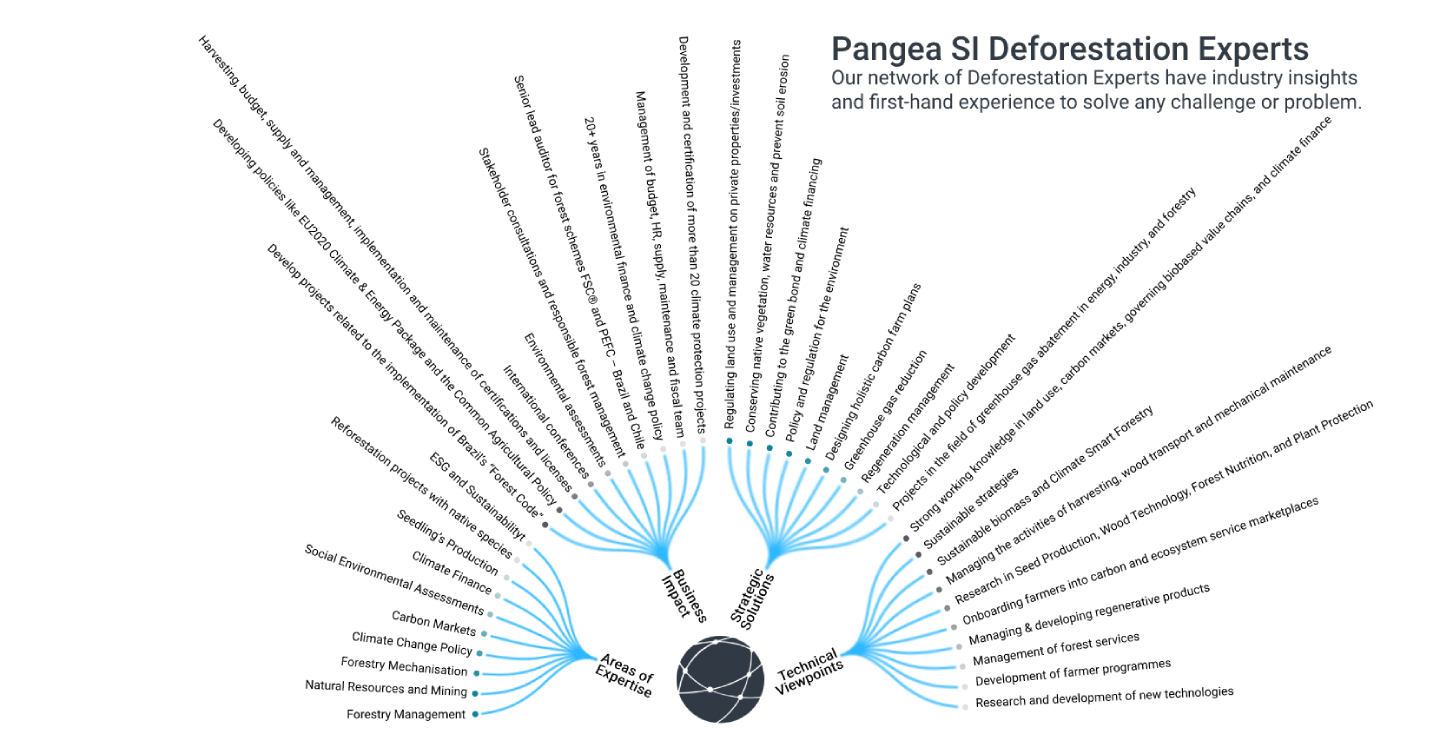Deforestation has been negatively affecting natural ecosystems, biodiversity, and the climate, with the heaviest levels of deforestation taking place in tropical rainforests.
Forest areas still cover around 30% of the world’s surface. 50% of the world’s forests are distributed in only five countries (Russia, Brazil, Canada, the United States of America, and China) and two-thirds (66%) of forests are in ten countries, but they are vanishing at a frightening rate. From 1990 to 2016, the world lost 502,000 square miles (1.3 million square kilometres) of forest area – this is an area similar to the size of South Africa. From 2004 – 2017 over 166,000 square miles, an area roughly the size of Morocco was lost.
From when humans started cutting down forestry land, 46% of trees have been lost, a 2015 study in the journal Nature stated. In addition, 17% of the Amazonian rainforest has been lost in 50 years. But recently there have been signs of improvement. Between 2015 and 2020, the rate of deforestation was estimated at 40,000 square miles per year, down from 62,000 square miles per year in the 1990s.
Agriculture is the front driver of deforestation, large-scale commercial agriculture (mainly cattle farming and cultivation of soya bean and palm oil) accounted for 40% of tropical deforestation between 2000 and 2010, and local agriculture was another 33%.

The threats that deforestation presents to our planet and nature differ around the world. In the tropics, deforestation takes place to create space for things such as cattle ranching, palm oil, and soy plantations. Demand for wood products can be a larger threat to other forests around the world. Each forest has its own unique challenges and threats endangering it.
Around the world, 250 million people who live in forests and savannahs require them for subsistence and money. Many of these people are also among the world’s rural poor. Forests play a major role on our planet and we need them for a wide range of reasons.
Cutting down trees and forestry areas both adds CO2 to the atmosphere and removes the ability to absorb and remove existing CO2 from the atmosphere. If tropical deforestation was ranked along with every country by carbon dioxide-equivalent emissions, the World Resources Institute stated it would rank third, with only the USA and China above it.
Reforestation is the process of planting trees in an area where the number of trees has been decreasing. Afforestation is the process of new trees being planted in an area where there were no trees before, creating a new forest. These activities will play a big role in the sustainability of the world’s forests and our environment.
Reforestation must provide benefits to the local population. It is important to commit to and work with local villages and communities to achieve successful reforestation. The second element for successful reforestation is funding. Donors, businesses, and grants are essential. Without strong funding and backing successful and long-lasting reforestation is not possible.
Across the planet, hundreds of organisations, charities, NGOs, and more are operating in an attempt to provide forest sustainability.
Eden Reforestation Projects
Eden reduces poverty and helps restore forests by employing local people to plant millions of trees every year in Nepal, Madagascar, Haiti, Indonesia, Mozambique, Kenya, Honduras, and Nicaragua. The Employ to Plant model benefits local communities with steady employment, and they can slowly afford daily necessities such as food, shelter, and medicine.
ReforestACTION
Reforestation projects aim to restore degraded forests and contribute to socio-economic development. They support projects across Europe, North America, South America, Africa, Asia, and Oceania.
Europe, France: The French forest covers 31% of the territory. It is now affected by degradation due to natural disasters and diseases. During 2019-2020 263 projects were started throughout France. The projects aim to restore forests affected by natural hazards, revitalize impoverished forests, reforest abandoned agricultural land, create hedgerows or create urban forests.
South America, Peru: Areas of Peru have suffered from rapid deforestation since 2000. This is due to new infrastructure developments and agricultural programmes encouraging the cultivation of rice, coffee, and palm oil. Since 2016, ReforestACTION has worked with the Urku Centre. The objective is to create agroforestry systems to develop the local economy and restore the area’s forest ecosystems.
Team Trees
This organisation has planted over 23 million trees in two years across the planet.
Argentina, Bolivia, Chile, Ecuador, and Peru:
200,000 trees – This project is focused on replanting a critically important ecosystem within the world’s longest continental mountain range. Native trees will be planted to aid long-term climate sustainability and water security.
Brazil:
600,000 trees – Working with local partners like Forest Trends, aims to provide food security and income alternatives for thousands of locals, as well as contributing to conservation efforts and helping mitigate climate change.
United Kingdom:
24,000 trees (Urban Sites) – Cities in the United Kingdom are looking to expand their urban tree canopy. Planting efforts will focus on areas with the greatest need for trees.
50,000 trees (Woodland Sites) – This organisation has partnered with the Woodland Trust, the Arbor Day Foundation is working to support private landowners interested in planting trees on barren sites in need of tree cover. They aim to get the benefits of tree planting and agroforestry and create new woodland areas.
Palm oil companies are doing a lot to reduce their environmental impact following increasing public pressure. Huge global demand for palm oil is driving the destruction of tropical forests contributing to climate change and forcing multiple species to the edge of extinction.
China is the second-largest importer of palm oil in the world. In 2020, China imported 7.2 million tonnes of palm oil, of this less than 10% was certified as sustainable. A research project sampled 31 firms in China’s palm oil value chain, this included palm oil importers, manufacturers of food products and personal care products, and food services/restaurants. The project studied the flows of finance, identified the financial institutions funding them and calculated how much of their money is related to deforestation risks. From 2013 to 2020, these 31 companies received $28.7 billion of loans related to palm oil in China. $5.1 billion (18%) was provided from 75 Chinese banks. 36% of that went to producers of edible oils. 33% went to palm oil trading firms. Chinese financial institutions and banks need to understand their implications and pay more attention to palm oil-related and deforestation risks they pose.
The top 6 causes of deforestation include:
| Livestock Agriculture Cattle farming is the single largest cause of deforestation. In the Amazon, and it accounts for 80% of current deforestation taking place, as demand increases and the area for cattle required continues to grow. |
Arable Agriculture With agriculture causing around 80% of global deforestation, not all of it is cattle ranching. Another big player is arable farming, mainly soybean and palm oil plantations. The demand for these products has led to their extensive growth. Needing the tropical climate to grow successfully rainforests around the world have been destroyed for these plantations. |
| Mining Mining in tropical forests is increasing because of rising demand and rising mineral prices. In addition, major mining projects bring infrastructure, such as roads, railway lines and power stations. Which can be economically beneficial but also environmentally damaging. |
Urbanisation Human population growth expands across the world. To accommodate these vast areas of forest get cleared for new cities and settlements. Along with these new settlements comes even more infrastructure like roads, bridges, water and sewer systems, railways, airports, harbours, and more. This expansion degrades ecosystems, endangers plant and wildlife species, and leads to a reduction in biodiversity. |
| Forestry Practices Approximately 1,500 square miles of forest is lost every year to meet the demand for wood and wood products. This makes up around 60% of forest degradation. Another 25% of the forest is degraded for fuelwood and charcoal. These practices also make land more vulnerable to urbanisation and mining. |
Natural Causes Extreme weather and natural events like wildfires, droughts, and storm surges destroy thousands of square miles of forest every year. These events are a more common occurrence due to climate change. After these disasters, it is easy for foreign diseases and invasive species to move in providing more competition to native species. |

More Confident Investment Decision Making
Expect to make truly informed, risk-reduced decisions. 100% of our clients believe our platform has enabled them to “increase the speed of their early-stage research into new areas.”
Insights On Demand – in as little as 48 hours
You can access subject matter experts from anywhere in the world, whenever you need them. When technical challenges or commercial projects arise which need specific results, you can obtain valuable consulting recommendations from vetted Experts.
Commercially Effective Research
Your research capacity and capabilities are augmented through Pangea SI Experts – there is no need for hefty strategy/management consultancy retainers and you can forego the process of having to hire someone full time.
1
Clients notify us that they need leading insight for their project.
2
We engage and vet subject matter Experts matched to the request at speed.
3
Clients consult with their shortlisted Expert(s) and obtain forward knowledge to incorporate into their strategic plans.
4
Clients benefit from more refined analysis and practical recommendations to achieve a quantifiable business impact.
